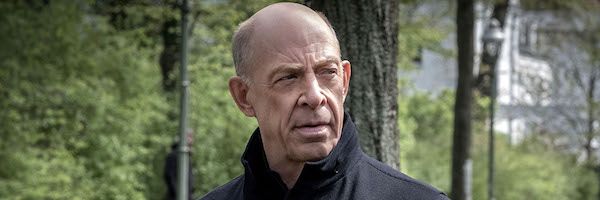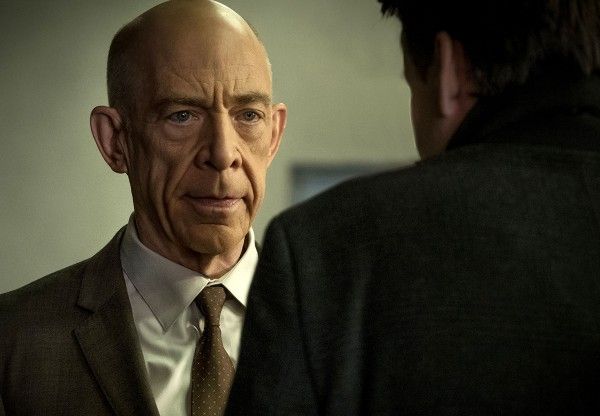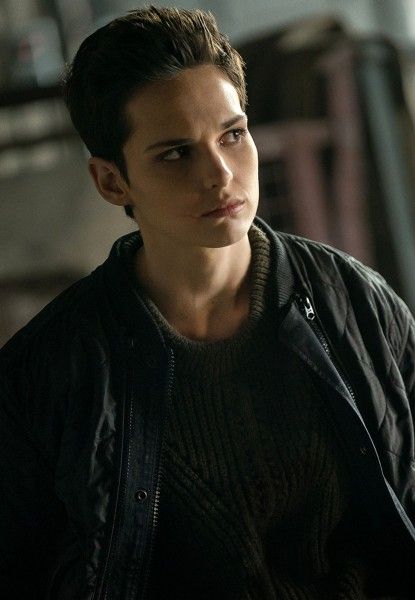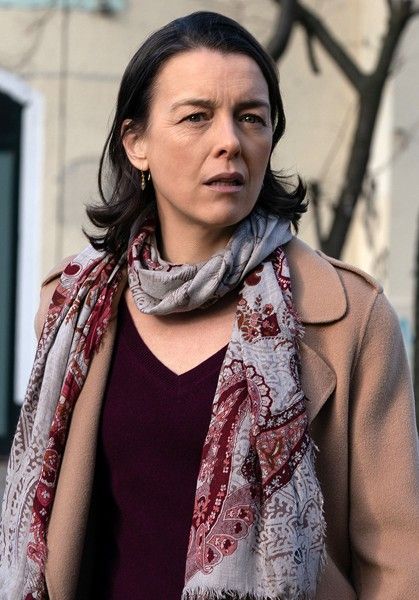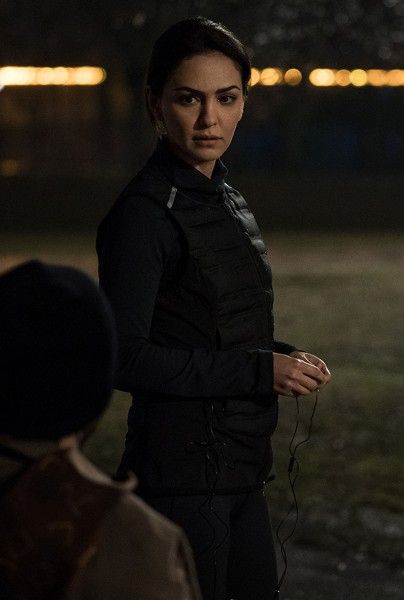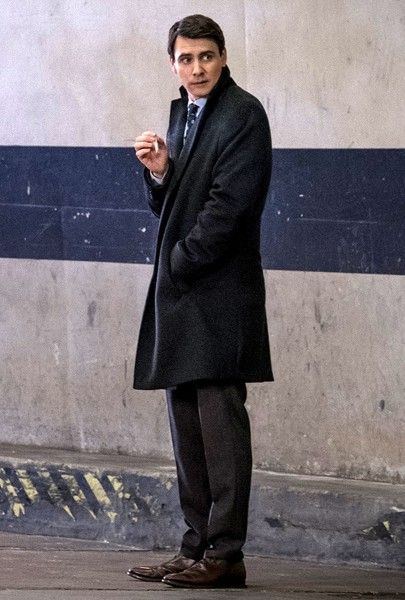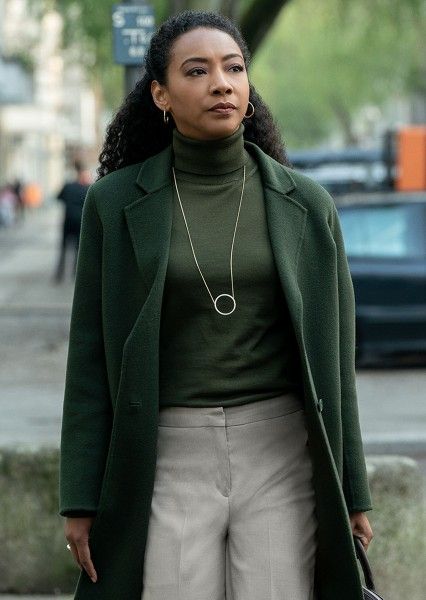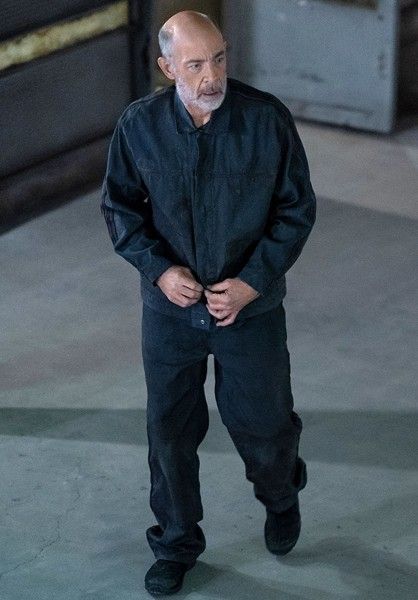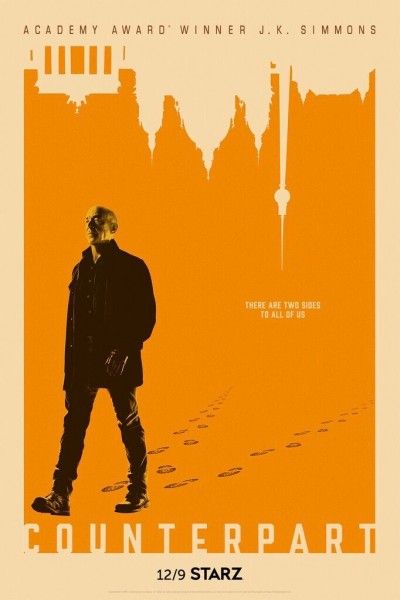In Season 2 of the Starz drama series Counterpart, the Crossing between parallel dimensions is closed and Howard Prime (J.K. Simmons) is going to work and living his life while his counterpart Howard Alpha (also J.K. Simmons) is locked in a mysterious black site and cut off from everyone he knows, each stranded in the other’s world and adapting for their own survival. As war between the worlds escalates, both men find the lines between them blurring in ways they never would have expected.
During this 1-on-1 phone interview with Collider, executive producer Jordan Horowitz (La La Land) talked about what it’s been like to produce his first TV series, alongside first-time showrunner Justin Marks, building on the storytelling for Season 2, what most impresses him about the dual performance J.K. Simmons delivers, adding new characters, the show’s female perspective, and the hope that they’ll get to continue telling this story for a third season. He also talked about the Apple TV series he’s doing with Damien Chazelle, the movie he’s producing for the upcoming Disney streaming service, and working in a space where it feels like anything is possible.
Collider: I absolutely loved the first season of Counterpart, and while I was excited to see where Season 2 would go, I was also nervous about the second season being able to live up to what was established. I’ve seen screeners for the first two episodes of Season 2, but I’m already very intrigued and excited to see where things go this season.
JORDAN HOROWITZ: I’m very excited about Season 2. I think it does a really awesome job of staying true to what this show was, but really growing out the world, especially with the exploration of Management, and the hierarchical structure of what that means to our world and the other world. It’s really compelling stuff, so I’m excited for people to see it.
This was the first TV series that you’d taken on, and you did it with a first-time showrunner. What has the overall experience been like, producing this?
HOROWITZ: That’s a great question. Yes, it was my first TV show. I come out of the feature world, and so does (showrunner) Justin [Marks], for that matter. I’m definitely someone who doesn’t love to just jump into things that I don’t have all of the information about, so when Justin first came to me with the show, we weren’t sure what it was. It was just an idea that we liked, and maybe it was a movie, maybe it was a show. It very quickly it became a show, and then MRC heard the pitch, very loosely, in a general meeting and decided to develop it. Interestingly, the process on this show was very similar to film development. The way MRC does stuff is that it’s a much smaller development process. It’s not the grind of network development. We were able to develop it in a vacuum, with a good amount of time. Then, we wound up packaging the show, in the first season, with J.K. [Simmons] and Morten Tyldum directing the pilot. So, once we had that package, we were able to take it to market, much in the same way that I would develop a feature script. From a process point of view, it felt very familiar. And then, once we got into production, especially in the first season, there was a lot of learning, and learning as we went. We learned a lot of lessons. Last year, we did 2/3 of the show in L.A. and 1/3 in Berlin. Our production schedule was such that we shot all 10 episodes in L.A., and then we went to Berlin and shot the exteriors in the Berlin sections of all 10 episodes, which was really complicated because we didn’t really have a full cut of even the first episode.
Because we shot all 10 at once, we didn’t even have a shot of the first episode until we were done with the entire production period. We had cuts of things that we plugged things into, but we were never really able to get a sense of the show. It was complicated because it was very different, Having to show those incomplete cuts to studios and networks created a very complicated process. So, this year, we actually brought on a high-end production producer, Ed McDonnell, who also comes out of features and who really ran production, and we didn’t have someone like that, last year. I’m doing a bunch of stuff. I'm not day-to-day on production. Justin was there, but he was very much running the room this year, and Ed was running the set. Then we also did 2/3 of the show in Berlin, this year, and only 1/3 in L.A. By the time we were done with the L.A. section, we had our first five episodes, and then we went back to Berlin and cleaned up the back five. It’s very complicated, shooting on two continents and in two separate worlds, with a cast like this. There’s obviously a learning curve. But, in terms of production this season, I don’t want to say it was easy, but it was a better plan that ultimately led to a more successful and a little bit bigger season for us.
You hear TV producers talk about how, once get a season under your belt, it gets easier because you have a better idea of what it is that you’re doing and how to make it all work. Did things actually get easier with this show, or is it just a new set of challenges with each season?
HOROWITZ: It’s not easy, but the second season was easier, just because we had the personnel this season. We learned a lot of lessons from the first season, in terms of what type of personnel we needed, what our locations were gonna be, and what continents we were gonna shoot on. We’re shooting a show on two continents , in two separate worlds on those continents, and with many actors playing two different versions of themselves. There’s literally no version of that that’s gonna be easy. It’s only easier than previously because you learn certain lessons from doing it. We’ll see, if we do a Season 3, what happens with that. We have a lot of fun making the show. I think we’re executing it as high-level as we could be, given the circumstances of it.
Anybody who’s ever seen him in anything knows what a great actor J.K. Simmons is, but what most impresses you about watching what he’s done on this show, playing these two different versions of the same character?
HOROWITZ: Honestly, that’s an easy answer. It’s his physicality, and the way that you know who he is, just from looking at him. You see a frame of him, even just his face – it doesn’t have to be his whole body – and you just know. At a certain point, in Season 1, they were playing each other. The Prime was playing Howard, and Howard was playing Prime, and they were twisting themselves into pretzels, in terms of playing a version of Howard that’s playing back into a version of Howard. We were always able to ground what world we were in and who we were with by his performance, especially in that first season. In the second season, that expands to a bunch of other characters. There are some very specific locations that help ground us, from world to world, but for me, the most impressive thing is that we didn’t really have to rely on any gimmicks or anything. I remember there was a conversation, very early on in the first season, about, “Do we need one side to be a different color? How are people gonna know?”
But Justin and I were never interested in that because we were always pretty certain that the thing that would come first in the show is the character work, and that continues in Season 2. You can call it science fiction, and there’s a really exciting genre element behind the world building, but front and center is the character work, and using that genre to amplify the character work. We felt pretty certain that, as long as you were invested in the characters and the relationships of the show, and the heightened nature of the everyday stuff, it would work. I think Quayle and Clare is a really good example of that because it’s a marriage that’s breaking up, and they’re being forced to stay together for some very specific reasons. You’ve seen marriages that have broken up, where they’ve stayed together for specific reasons, but not for this particular reason. It’s that very familiar, very acceptable dramatic tension of the marriage, amplified as a result of the genre element behind the show. That was always our pursuit with the show, and as long as that works, we feel like the audience will follow along, even if there’s some confusion, in worlds and conflicts. The first season proved that, and in the second season, we dive even more into that.
When you’re called one of the Best New TV Series of 2018 on your first TV series, does that create a certain level of pressure for you?
HOROWITZ: Yeah. It’s certainly exciting. Justin and I approached this from a feature place, and we wanted to execute it, at a certain level. I think people expect that now from their content. I’m making a movie, right now, for the Disney streaming service. As we get into the robustness of the streaming world, there’s a lot of content, but the stuff that will rise up is stuff that is done passionately and artfully, with a lot of certain eye towards craft. That just tends to be how I do my work. I’m happy when people respond to the work that I’m doing, but it’s certainly not why I do it. I enjoy working with the people that I work with and telling the stories that I tell. It’s always a bonus to me when that happens. Very early in my career, the reception was a lot more in the forefront of the work that I did. Now, I like to be working on something else, when I’m in the release stage of the other work that I’m doing. Actually doing the work, and the way the work is done, is the only thing that I have any control over. The way people respond to the work that I and my collaborators do, I have literally zero control over. Trying to wrestle control of that with the things that did earlier in my career just created a lot of disappointment, so I learned not to do that anymore.
I love this cast, and they’re all so talented. How do you feel about the addition of Betty Gabriel and James Cromwell, this season?
HOROWITZ: They’re two exceptional actors. I didn’t really know Betty until I saw her in Get Out. Then, when we were casting this role, she was someone that the casting directors put on a list and, when I got the list of people for that role, I was like, “She’s the one that we should cast.” Obviously, we brought in people to read, but she ultimately did get the part, which I was thrilled about. She’s a wonderful human and an incredible actor, and it’s really nice to have her on the show. With James Cromwell, when we were looking for someone for that role, we wanted someone who had a certain amount of gravitas without really having to do much, so we went right to older, more statesman-like actors. He raised his hand, and it was just a real blessing.
I also really love the female characters on this show. It’s got a really great collection of some of the most just fascinating female characters, and they all have such interesting motivations.
HOROWITZ: Thank you for saying that. Our writers’ room is very female, and they would be happy to hear you say that. Obviously, Justin runs the room and I’m one of the EPs, but there are a lot of women in that room and their focus has very much been those female characters, so it’s nice to hear you say that. Emily and Emily Prime have amazing arcs this season. I love the Quayle/Clare relationship, and Nazanin [Boniadi] is awesome. I love her character, and she really blossoms this season. A woman who very much becomes the centerpiece of this season, who was in Episode 107 last year, running the school, is another really amazing character. She starts to really grow and you learn a lot about her, over the course of the season. It’s awesome. I’m excited about seeing the world through more characters’ eyes. Obviously, we still have J.K. and we still follow his story, but we’ve gotten a bit more expansive in this season, which is cool.
By the end of this season, how do you hope viewers will feel about the journey that they’ve been taken on, and does it feel like you’re setting things up for a possible Season 3?
HOROWITZ: I do think the end of Season 2 will feel very satisfying, especially in terms of the Howard and Emily, and Howard Prime and Emily Prime arc. We always talked about that. When we originally sold the show, it was a two-season pick-up, so we always talked about their arcs, over the course of two seasons. I think there are tons of opportunity for continuing to expand the world, and those seeds are very much in the second season. Should Starz and everybody want to do a third season, there’s infinite stuff to explore yet. That being said, the Howard and Emily storyline should feel satisfying, in a complete way. There are still questions to be answered, but I don’t necessarily think that you have to answer all of the questions, in order for something to be satisfying. I think we’d all be incredibly excited to continue not only Howard’s journey, but the journey of the world. One thing that comes a lot more into focus this season, as we start to explore Management, is just how massive this world potentially could be and what the dynamics are between the two worlds. We saw it very much through Howard, in the first season, and in this season, we’re seeing it through a lot more eyes. To me, that’s really exciting and gives us a lot of opportunity to do really interesting stuff in a third season.
You’re set to do another TV series, with Damien Chazelle for Apple.
HOROWITZ: Yeah.
What are you most excited about with that? Is that another TV project that you’d approach like a movie?
HOROWITZ: Yeah, very much so. It’s almost an 8- or 10-hour movie, is the way that we’re really approaching that one. We’re in the middle of writing it right now, and then Damien is gonna direct all of them. We will need to really approach it as a large feature, very much in the style of the European TV shows that [Ingmar] Bergman used to do, like Scenes from a Marriage. There’s definitely a history of shows that were done for European television that were “limited series.” It was very much features, but 6-, 8- or 10-hour features that were character focused, very intimately detailed, and telling the story of the individuals, in a place at a time. That really is the history that we’re going for, with the world that we want to live in.
Does that feel like a huge undertaking, when you are looking at it as a big movie like that?
HOROWITZ: Oh, it’s enormous because it’s so much. It’s so big. Damien is probably the most ambitious director that I’ve worked with. There’s no compromising with him. When you’re in it with him, it’s very intense, in the best way. It’s a lot of fun, but it’s very ambitious, and the work is really hard. It was that way on La La Land, and thinking about doing that times eight is daunting, but also exciting. It’s nice to get lost. I like doing the work of it. That’s really what I find the most enjoyable it -- developing it, shooting it, cutting it. The actual craft and the making of the thing is where I tend to find my pleasure in my work, with the job that I do, so I’m looking forward to being lost in that. That will be a lot of fun. I think it’ll be a very big shoot, in multiple places, so we’ll see how that all plays out.
Because it seems like something that we still don’t know much about yet, what do you find appealing about Apple, as a partner for television?
HOROWITZ: I actually find that to be the most appealing thing. I like working at places where it feels like anything is possible because they don’t really have a way of doing stuff yet. It’s interesting, I’m making a movie (called Stargirl) with Disney right now, but it’s for the Disney streaming service, which doesn’t exist yet, and they are really interested in finding their identity. Not necessarily the identity of the brand because, obviously, they have the strongest identity as a brand. I think it’s about finding a way to say, “Okay, we’re Disney and this is going to be our brand, but how are we going to be able to stretch it? How are we going to push it a little bit, now that we’re living in the streaming space?” So far, it’s been a really amazing focus on the quality of the content. The two things that they’ve greenlit for that, so far, are the YA books. I’m making one of those movies, and Tom McCarthy made the other one. Then, I think there are a couple of other pictures that they’re putting through the streaming service. It’s really awesome working with a company like Disney and a company like Apple, that has all the resources in the world and an incredible infrastructure built, but is also open to working with talent to say, “Okay, what’s this thing gonna be? How are you going to help us define this?” I find that super exciting. I’m doing something with Amazon, I’m doing something with Apple, I’m doing something with Disney, and I’m doing something with Netflix. Those companies are pushing out into a space that’s still in its infancy. I know Netflix feels enormous and they own that space, but all these companies are now coming into that space in a much more aggressive way, which will continue to shift the space. For me, it just feels super exciting to watch them find themselves. The model starts to change, and what you can do and what becomes possible is the sky’s the limit, in many ways. I love that.
Counterpart returns for Season 2 on Starz on Sunday, December 9th.

